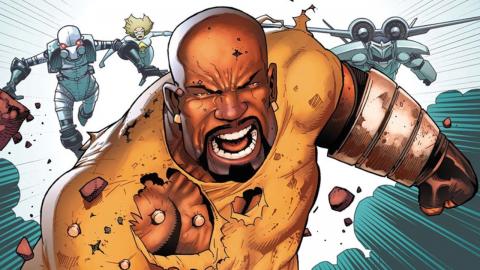Superhero Origins: Luke Cage

Superhero Origins: Luke Cage
Sweet Christmas! Life on the streets is rough, even for a hero for hire. Welcome to WatchMojo.com and today we will explore the comic book origin of Power Man, also known as Luke Cage. As with most comic book characters, there are often re-imaginations and different versions to a character’s past. We have chosen primarily to follow the storyline which unfolded in 1972’s Luke Cage: Hero for Hire #1-2 and which was expanded upon in 1992's Cage #3 and 2012's Avengers Origins: Luke Cage #1. Luke Cage holds the distinction of being the first black superhero to star in his own comic book. Sometimes called Power Man, Cage's origin unfolded in the first two issues of Luke Cage: Hero for Hire in 1972. Cage was introduced as an angry, bitter inmate of the inescapable Seagate prison. Very definitely his own man, Cage refused to play by the rules of prison life. This earned him the enmity of fellow prisoners as well as extra years on his sentence. A new doctor, Noah Burstein, approached Cage about participating in a risky research experiment. Cage told Burstein his story. He and his boyhood friend Willis Stryker had ruled a New York street gang together. But when Cage went straight, Stryker just got in deeper. When he got in too deep, Cage saved his life – as well as that of Stryker's girl friend. Stryker, though, didn't see it that way. He accused Cage of trying to steal his girl. To get revenge, he planted drugs in Cage's home and framed him as a dealer. Stryker also pushed his girl friend in front of a hail of bullets in order to save himself. His story finished, Cage agreed to participate in the experiment; if he survived, he would stand a chance of getting parole. Unfortunately, a guard with a grudge against Cage sabotaged the experiment, hoping to kill Cage. It didn't work out that way. Instead, Cage emerged from the experiment with super-strength, bulletproof skin and an accelerated ability to heal. Cage escaped from prison, made it back to New York and set up shop as a "hero for hire." Anyone who needed his services had to pay for them. He also set about hunting down Stryker, now known by the name Diamondback. Cage found him, but the villain fell victim to an explosive dagger he had ironically created to kill Cage. Although the basics stayed the same, Cage's origin story underwent minor revisions throughout the years. In 1992, his early years were fleshed out through the addition of a father who was an ex-cop who tried to keep him on the straight and narrow. In his 2012 re-telling, Cage started to turn to crime after obtaining his super-powers. He robbed a bank with two accomplices. When one of the accomplices shot a bank guard, Cage quickly abandoned the life of crime. It turned out he also used much of the money he made as a hero for hire to provide for a good life for the guard who had been shot. Luke Cage is the kind of tough-talking, no-nonsense character that fits in well with action-oriented projects. He has made a number of appearances in Marvel-related media projects, although he's often watered-down a bit for them. Undoubtedly, he will punch his way into more in the future. Are you a fan of Luke Cage? For more comic book origins, be sure to subscribe to WatchMojo.com.

